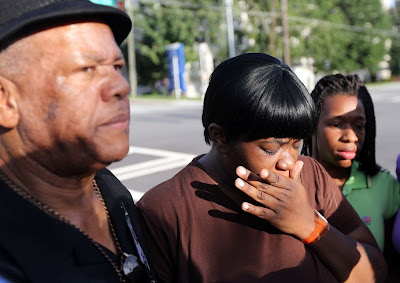This "change of heart" is undoubtedly the work of activists in Atlanta and around the country who have bombarded the hospital with calls to save Anthony Stokes' life over the past week. Activism really can shift the tide.
by Rania Khalek, Dispatches from the Underclass
Without giving a reason, Children’s Healthcare of Atlanta reversed its decision to deny 15-year-old Anthony Stokes a new heart.
“We met with hospital officials about 30 minutes ago,” family spokesman Mark Bell said this afternoon. “After reviewing the situation, they said Anthony would be placed on the list for a heart transplant and that he would be first in line, due to his weakened heart condition.”
Bell said hospital officials did not offer a reason as to why they changed their minds.
In a statement issued shortly after the family’s announcement, Children’s Healthcare of Atlanta said: “As we stated previously, a heart transplant evaluation is an ongoing process based on the patient and his or her family’s ability to meet specific transplant criteria. … Our physician experts are continuing to work with this family to establish a care plan and determine the best next steps for the patient.”
Anthony suffers from dilated cardiomyopathy. Without a new heart, doctor’s say he will die within three to six months, according to his mother. Over the weekend, the hospital notified the family that Anthony was not a good candidate for transplant due to a “history of noncompliance”, which was determined base on low school performance and a run-in with the law.
To read more about disparities in the organ transplant process, check out my post from Monday.
 |
| Melencia Hamilton, Stokes' mother, after hearing that the hospital reversed its decision (Ben Gray/Atlanta Journal Constitution) |
by Rania Khalek, Dispatches from the Underclass
Without giving a reason, Children’s Healthcare of Atlanta reversed its decision to deny 15-year-old Anthony Stokes a new heart.
“We met with hospital officials about 30 minutes ago,” family spokesman Mark Bell said this afternoon. “After reviewing the situation, they said Anthony would be placed on the list for a heart transplant and that he would be first in line, due to his weakened heart condition.”
Bell said hospital officials did not offer a reason as to why they changed their minds.
In a statement issued shortly after the family’s announcement, Children’s Healthcare of Atlanta said: “As we stated previously, a heart transplant evaluation is an ongoing process based on the patient and his or her family’s ability to meet specific transplant criteria. … Our physician experts are continuing to work with this family to establish a care plan and determine the best next steps for the patient.”
Anthony suffers from dilated cardiomyopathy. Without a new heart, doctor’s say he will die within three to six months, according to his mother. Over the weekend, the hospital notified the family that Anthony was not a good candidate for transplant due to a “history of noncompliance”, which was determined base on low school performance and a run-in with the law.
To read more about disparities in the organ transplant process, check out my post from Monday.
